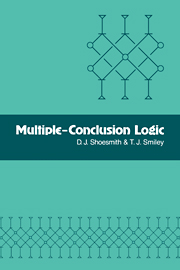Book contents
6 - Infinite rules
Published online by Cambridge University Press: 06 July 2010
Summary
Infinite rules and proofs
To develop a multiple-conclusion predicate calculus, Carnap and Kneale introduce the rule ‘from (∃x)Fx infer Fx1,Fx2,Fx3,…’, whose conclusions are meant to represent all values of the propositional function expressed by Fx (cf. Section 20.2). Instances of this rule may obviously have infinitely many conclusions, and the converse rule for the universal quantifier, ‘from Fx1,Fx2,… infer (x)Fx’, raises a similar point for single- as well as multiple-conclusion calculi. We shall briefly consider how the admission of such rules affects what we have said so far. We therefore relax our previous requirement that a rule of inference must be finite in the sense that X R Y only if X and Y are finite, and allow rules of the form ‘from X infer Y if X R Y’ without any restriction as to finiteness; and similarly for single-conclusion rules.
An immediate effect of the change is that in general ⊢R is no longer compact. Hence every calculus, whether compact or not, can be characterised by rules of inference, if necessary by taking the consequence relation of the calculus to be the rule. Calling a calculus conclusion-compact if whenever X ⊢ Y there is a finite subset Y′ of Y such that X ⊢ Y′, one might well suppose that when every instance of a set of rules has a finite set of conclusions the resulting calculus will at least be conclusion-compact. Curiously enough, this is not so.
- Type
- Chapter
- Information
- Multiple-Conclusion Logic , pp. 95 - 102Publisher: Cambridge University PressPrint publication year: 1978



